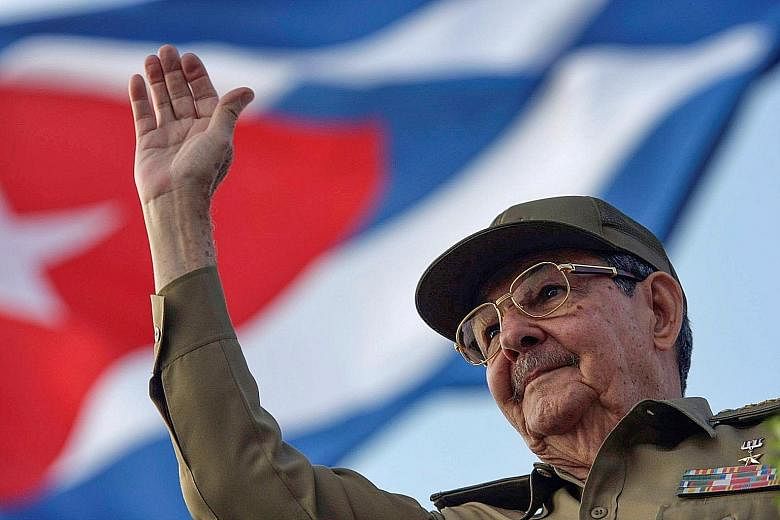HAVANA • Mr Raul Castro confirmed that he was handing over the leadership of the Cuban Communist Party to a younger generation at its congress that kicked off on Friday, ending six decades of rule by himself and his older brother Fidel.
In a speech opening the four-day event, Mr Castro, 89, said the new leadership would be party loyalists with decades of experience working their way up the ranks and were "full of passion and anti-imperialist spirit".
Mr Castro had said at the previous party congress in 2016 it would be the last one led by the "historic generation" who fought in the Sierra Maestra to topple a US-backed dictator in the 1959 leftist revolution.
He already handed over the presidency in 2018 to protege Miguel Diaz-Canel, 60, who ran the party in two provinces before joining the national government.
The new generation of leaders, which did not forge itself through rebellion, has no easy task.
The transition comes as Cuba faces the worst economic crisis since the collapse of former benefactor the Soviet Union, while there are signs of growing frustration, especially among younger Cubans.
"I believe fervently in the strength and exemplary nature and comprehension of my compatriots, and as long as I live, I will be ready with my foot in the stirrups to defend the fatherland, the revolution and socialism," Mr Castro told hundreds of party delegates gathered at a convention centre in Havana.
The congress, the party's most important meeting, held every five years to review policy and fix leadership, is a closed-door event but excerpts are being broadcast on state television.
Mr Castro became acting president when Fidel fell ill in 2006, and later in 2011 became party leader, launching a raft of social and economic reforms to open up one of the world's last communist-run countries that later stalled.
On Friday, he hailed Mr Diaz-Canel as a new-generation leader who was picking up from where he was leaving off.
Mr Castro's olive green military fatigues contrasted with the civil get-up of his protege, who is widely expected to succeed him as party first secretary, the most powerful position in Cuba's one-party system.
Older Cubans said they would miss having a Mr Castro at the helm, although most acknowledged that it was time to pass on the baton.
Mr Castro said Cuba was ready for a "new type of relationship with the United States without... Cuba having to renounce the principles of the revolution and socialism".
According to declassified documents published on Friday, the US Central Intelligence Agency (CIA) made its first known attempt to assassinate a leader of the Cuban revolution in 1960, offering US$10,000 (S$13,300) to a pilot flying Mr Castro from Prague to Havana to arrange an "accident".
Pilot Jose Raul Martinez, who had been recruited by the CIA, asked for - and received - assurance from the agency that it would provide university education to his two sons if he died during the operation, according to the documents published by the Washington-based National Security Archive research institute.
After Mr Martinez left for Prague, CIA headquarters in the United States told its Havana station to cancel the mission.
"Do not pursue," the cable said. "Would like to drop matter."
At that point, the pilot was already out of contact. When he returned to Cuba, Mr Martinez told his handler that "he had no opportunity to arrange an accident such as we had discussed".
Mr Castro's departure ends a six-decade family hold on power in Cuba that started in 1959.
"These documents remind us of a dark and sinister past in US operations against the Cuban revolution," said National Security Archive analyst Peter Kornbluh.
REUTERS, AGENCE FRANCE-PRESSE

